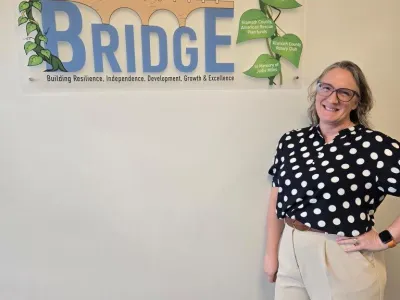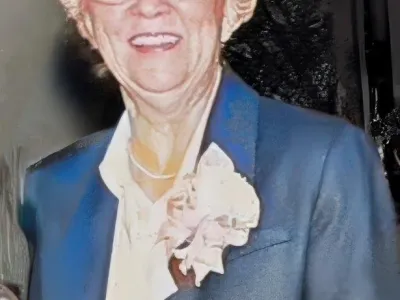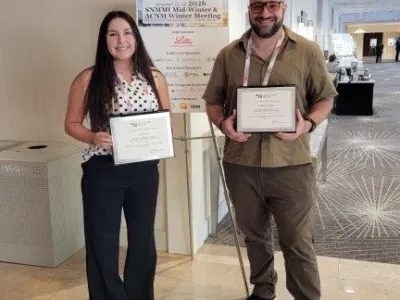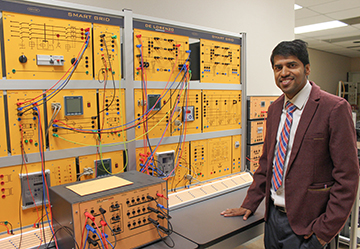
Hossain is also not an academic to rest on his laurels. With an impressive background including a Ph.D. from the University of Wisconsin-Milwaukee in Renewable Energy and Advanced Control Systems, since coming to Oregon, he also became a registered Professional Engineer (PE) with a focus on Power Systems. And recently Dr. Hossain successfully completed the Renewable Energy Professional (REP) test offered by the Association of Energy Engineers (AEE), and obtained Professional Certification on Energy Innovation and Emerging Technologies from Stanford University. At Oregon Tech he jumped at the chance to participate in the Oregon Tech Excellence in Teaching Workshop as he believes strongly in continuously improving his capabilities to provide better teaching and learning environments to his students, and better service to the institution and community. This also includes serving on Faculty Senate, the Academic Standards Committee, Graduate Council and the Faculty Welfare Committee; and community events such as Summer LEGO Camp.
“I am always trying to pick up new skills, especially teaching and management expertise, so that I can serve students and the field at large better,” stated Dr. Hossain, who was awarded the Rising Faculty Award at Oregon Tech in 2017.
His research projects focus on the real-life applications in the renewable energy and power sector, challenging students with real-world problems and creating the space for them to innovate, take risks, fail sometimes, and innovate some more.
Dr. Hossain is highly involved in the scholarly field as well, and a contributor to a number of prestigious conferences and journals. As a senior member of IEEE, and an associate editor of several reputed journals including IEEE Access, he was recently also recognized as being among the top 1 percent of reviewers in the field of Engineering. His involvement at such high levels in publishing, and his continuous effort to disseminate new knowledge (he has been cited 539 times to this date, with two best paper awards) has enabled his students to make their mark as well in the scholarly society through their participation in the research projects he has led.
Throughout his time at Oregon Tech, Dr. Hossain has worked closely with the Oregon Renewable Energy Center (OREC) – the university’s applied research center, endorsed and now partially funded by the State of Oregon. A few years ago, Dr. Hossain worked with Oregon Tech’s administration to determine how to take OREC from a quiet under-funded center with no state resources to one with a half million dollars from the state and the ability to attract major grant funding from foundations and the private sectors. OREC is now funding interdisciplinary research projects and encouraging collaboration with other institutes. Dr. Hossain is currently leading a team to investigate the application of machine learning for big data analysis that can lead to better operation of power utilities. His $25,000 project in this program is in partnership with the Marquette University, and supported by Portland General Electric (PGE). Students are also heavily engaged, gaining firsthand experience in system design, smart meter installation, data collection and analysis, and gaining professional practice that will give them a leg up after graduation.
Before this recent effort, Dr. Hossain undertook several other similar projects to increase student involvement in advanced research. He was awarded $32,500 from Oregon BEST NW Energy XP in 2016-17 which led to a simulation game developed by the student hired for this project, Michael Larabee. The game was designed to provide an experience in managing power stations in systems modelled after real power grids. Also in this year, he led student projects on reuse of battery and motor control, with a $10,000 grant from EPRI GridEd West (where Oregon Tech is a PGE affiliated partner). The year prior, he arranged a MATLAB/Simulink seminar in the campus as well through a CCT grant.
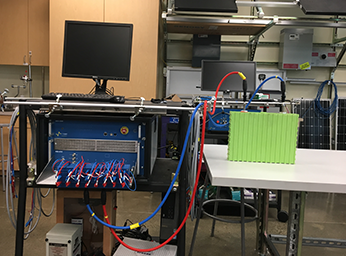
“Our primary motivation with these projects is to provide undergraduate students a unique chance to conduct industry-scale research with cutting-edge equipment and technologies,” said Dr. Hossain. He also described how such projects allow development of the university laboratories, and improve the curriculum, resulting in enhanced student success, retention and enrollment. These objectives really shine in the recently funded ‘smart grid’ lab development project for which the W. M. Keck Foundation provided a hefty sum of $225,000.
“The smart-grid project will significantly improve Oregon Tech’s lab facilities, which will allow adoption of course curricula specially designed for the swiftly changing power industry,” said Hossain. “This project is designed exclusively to improve the students’ competitiveness, practical knowledge and understanding of the next-generation power system – which is not common in the undergraduate level.
“We are working hard to provide our students the best education possible, and these projects are a great way to do that. Theoretical knowledge needs proper hands-on training for being effective to the full extent, especially in the field of engineering education. That is why lab development and projects are so important,” stated Dr. Hossain.
His plan is to continue building on the momentum of these programs, and enhance the lab facilities while keeping the course materials focused on the most recent technologies in the industry. Hossain is also keen on giving his students work on bigger, national stages. In his words: “We are trying to involve other institutes and industries in our projects so that our students are able to learn from a wider range of resources. PGE has been a very supportive partner of us for a long time and we have recently started to work with Marquette University as well. We are really looking forward to joining other renowned institutions such as the University of Washington, and also arranging events at our campus such as seminars and invite pioneers in this field so that they can share their vision with our students. Those will significantly enhance student competence in the job market, and increase their success rate – which is our ultimate objective.”
Yes, Dr. Hossain is a man on a quest. And lucky for Oregon Tech, he is taking his students – our next generation of renewable energy engineers – along with him on this always exciting innovation journey.
###







